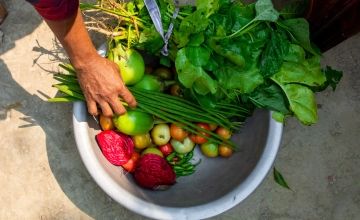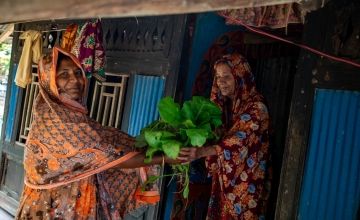
Knowledge Hub
Due to its topography and climate, Bangladesh ranks first in the world in terms of vulnerability to tropical cyclones. It is also extremely vulnerable to climate change, including droughts and flooding. These factors make growing food particularly difficult, leaving millions of people in the grip of extreme poverty.
Concern has worked in Bangladesh for 51 years, bringing sustainable, positive changes to the lives of people living in extreme poverty. In light of the countries challenges, a lot of our work focusses on climate smart agriculture and livelihoods training.
Earlier in 2023, we met a number of women who had received this training and have, quite literally, grown their way into a secure future with climate resilient farming.
Meet Asma

37-year-old Asma has three daughters and lives in the climate vulnerable district of Bagerhat in southern Bangladesh. In 2020, she was introduced to Concern’s collective responsibility, action and accountability for improved nutrition (CRAIIN) project, where she received two days of training, half a kilogram of earth worms, two compost rings, one slab to make compost, saplings and four types of seeds.
Now, she has grown a fruitful garden, using the vermicompost that she makes herself and the climate smart agriculture techniques she learnt on the training.
During the training, I learnt about the vermicompost production procedure, climate smart technology, and bio pesticides, which I am very interested in. I also learnt from the training how to cope with cyclones or any other kind of storm in terms of agriculture and cropping patterns.
Before the training, Asma didn’t know how to grow vegetables or make her own vermicompost. She didn’t have an income and couldn’t afford to send her children to school.
Now, however, things have changed. She tells us: "My life changed totally after starting with the farming compost. Now I can afford education for my children. This is important. Now I can live in a better way.”

In about three years, everything has changed. It started with the CRAAIN project and now that's continuing.
Asma grows seasonal vegetables, throughout the entire year. Whilst she is growing one crop, she is preparing another, using climate smart techniques such as the harvesting system and raised seedbeds.

Asma is able to sell her vegetables to the community, where there is a big appetite: “There is so much interest to purchase these products. When I display them in any market, the product is lucrative and everyone want to buy because of this vermicompost production.”
An inspiration for others
The CRAAIN project has not just supported Asma’s development. She explains how much it has helped the rest of the community in terms of agriculture production, water, sanitation and hygiene understanding, and nutrition knowledge. They also buy and sell products between households, including vegetables.
Asma is now a lead farmer, teaching others how to make vermicompost and grow produce in a climate-resilient way. She has connections to 400 households within the community.
What I have learnt with CRAAIN I don’t just keep this within the house – I replicate the message to other community members. When anybody needs any help or solutions, they come to me or I go to the community and we learn together.

Asma told us a story about how she supported another woman who lives with a disability. She taught them how to harvest rainwater, which is particularly useful in an area where clean drinking water is difficult to find. The family also needed a card to show they have a disability, and Asma fully supported the family to receive the personal disability card, as she is the only link between the family and the government. Then, she connected this family to the agriculture department who provided support from the government in terms of seeds, fencing and other important agricultural assets.
"I am so much excited and I am so happy and I want to do more for other people."
However, helping others has also helped herself in more ways than expected: “I used to depend on my husband. Now I am totally empowered in terms of money. I am independent. I do not depend on my husband”
Meet Hosenare

28-year-old Hosenare also lives in the Bagerhat district. She has two sons, one of whom lives with a disability. In in 2021, as part of the CRAIIN project, Hosenare received two days training in agriculture, cultivation, climate smart technology, WASH, and nutrition, and in 2022 one day of training by the lead farmer Esanuel, who had also taken part in the CRAIIN project two years prior.

After receiving the training, I tried hard with my soul from my heart to make some changes in my household. This land was plain before, nothing was here, only mud. One kind of training I received was climate smart technology. So, I raised the bed and started to use this land. Now I cultivate every year and have five beds.

Hosenare also uses the tower technique, which she learnt during the CRAAIN training. All of these techniques allow her to grow food in difficult conditions that are worsening over time due to climate change.
Hosenare has lived in the area for about seven years and explains that she has noticed the effects of climate change. The rainy season is not continuing as usual, on which they depend for drinking water and land cultivation. Last year, the family faced a strong cyclone. It flooded their land and everything they had grown was destroyed.
“When Concern provided the seeds, I learned from the project how to cultivate again and how to sustain what I grow, as seed preservation was a challenge in the past with cyclones. So much has changed after the CRAAIN project.
“Before the project, there was nothing here. Now, and after I received the training and different types of counselling, I have created my farm. I am feeling so much better and more empowered.
“I keep all the training and knowledge in my head and will continue to use it. I am teaching other how to cultivate vegetables.”

Innovative thinking, increasing nutrition
Hosenare cooks the produce grown for her family, and sells what is left at the market (keeping the money for her child’s education) or gives it to her neighbours.
Her life has changed significantly since she received the climate smart agriculture training, but so much of her success is down to her own hard work and innovative thinking. Within the mix of vegetables provided by Concern, there is one of Hosenare’s own invention. It is a red leafy vegetable, which is particularly useful in Ramadan and people are fasting, because it has a lot of nutrition in its leaves. There is no doubt that Hosenare will continue to be successful with her farming, without Concern’s help.
“If CRAAIN finished, I will continue with my own initiative and for my own needs, because I can take the fresh fruit and fresh food and fresh vegetables from my own garden. I also learnt how to introduce livestock and how to rear ducks and goats, and now I am empowered. It will be sustained for my own initiatives. There is no issue if CRAAIN or Concern goes. I have a dream to cultivate more and continue for my household.”
Meet Malika
Malika Begum is 56-years-old and lives in the northern district, Rangpur, in Bangladesh. Here, flooding is a huge issue, and this area in particular has around four to six months of flooding every year. For Malika and her family, flood preparation is extremely important on a personal level. Six years ago, she lost her 16-month-old grandson in a flood when he fell into the water.
Malika is a member of a local community group, which was set up as part of the Zurich Flood Alliance project. The self-help group was stablished in 2019 and the committee is made up of 17 local members representing 1700 households.

They meet once a month and the ultimate goal is to reduce the loss and damage caused by the flooding. They use techniques like raising the plinths, bringing livestock indoors, using local technology to stop erosion of land and making bamboo bridges. Concern also provided the group with a megaphone to alert the community of flooding.
Since the programme, we prepare for the floods immediately after receiving the early warning. We have dry food and stock stockpile food and keep our belongings raised, including the livestock.
Malika explains that although the floods are getting worse, now they are more prepared: “Now we feel more safe.”

As the main workforce in the area is agriculture, water stagnation as a result of flooding is also problematic. However, thanks to the programme and Malika’s hard work and skills, she can now grow green vegetables around the year; everything from pumpkins to leafy vegetables which are very nutritious.
Malika started using her land for a homestead garden in 2020, when Concern through the Zurich programme provided her, and the rest of the group, with seeds and training.
I like taking care of it. I am very proud. I water it every day.

Malika’s garden is particularly impressive, and while she sells some of it at the market, she allows her fellow community group members to help themselves for free.
Other ways to help
Donate now
Give a one-off, or a monthly, donation today.
Join an event
From mountain trekking to marathon running, join us for one of our many exciting outdoor events!
Buy a gift
With an extensive range of alternative gifts, we have something to suit everybody.
Leave a gift in your will
Leave the world a better place with a life-changing legacy.
Become a corporate supporter
We partner with a range of organisations that share our passion and the results have been fantastic.
Create your own fundraising event
Raise money for Concern by organising your own charity fundraising event.





